You know, I'm caught on the horns of a Dalai Lama with this album. To wit, how can such a hirsute gaggle of smoking enthusiasts capable of this stunning masterpiece have produced precisely squat of discernible merit before or since? I've never really believed in 'flukey' genius (as those hypothetically immortal monkeys astride typewriters with infinity to kill would eventually be whittled down to a partially shaved splinter group called the
Grateful Dead) As far as grievously irritating hippy cosmiche w.a.n.k goes, the cited accomplices that conspired to forge this creation are strenuously denied parole as the public need to be protected from Bethnal Green impersonating California (i.e.
Fleetwood Mac circa Albatross), together with known artless dodgers such as the
Steve Miller Band,
Quicksilver Messenger Service, Mother Earth and the durable Dead etc. To my ears the west coast influences from these bloated jam slags are usually overstated and fail to evince the more palpable echoes of
Jefferson Airplane and Family (erm...who weren't even from Bethnal Green) Unlike 2 Ozs. Of Plastic (With A
Hole In The Middle) and
Be Good to Yourself at Least Once a Day, there are no long spacey indulgences here and the prevalent mood is a welcome focus where the improvisation appears to have begat the songs and not vice versa. Therefore the discipline, restraint and structural rigour encountered throughout is completely at odds with the majority of
Man's output.
Angel Easy approaches a jazzier and maybe funkier country rock, a place where Albert Lee would feel entirely at home. Similar to the Kinks' Muswell Hilbillies it's remarkable how five scruffs from Merthyr Tydfil who also draw almost exclusively from American idioms and rhythm and blues forms still
Manage to sound indelibly and naturally British on material like this.
Twin guitar bands are something of a consuming fetish for this rodent with
Television, Barbaro, the Stones and Crimson all high on my list of those featuring partnerships where the twelve string whole conspires to be more than the sum of the individual six string parts. This exhilarating synergy is exemplified by
Many Are Called But Few Get Up where Leonard and Jones negotiate a tangential steeplechase of metrical hurdles but still produce an uber moreish toe tapping textural treat. Subtle phasing and wah-wah effects are used to achieve this end and like the beautiful gently over-driven crunch which they coax from their amps, nothing is overcooked or overdone. Deliciously languid slide guitar occasionally begs for our attention but is spirited quickly away, lending proceedings an anticipatory charge, like a lingering embrace. They also exploit key changes to mirror the desired atmospheric mood at any given time. Yep, these are exquisitely crafted songs where the ensemble writing and arranging process exploits all the player's strengths to best effect. In 1971
Man couldn't even get arrested in the UK (different story in Belgium where dope smuggling and people trafficking are often interchangeable, but you need to read Deke Leonard's sleeve-notes for that) They were however achieving modest success in Europe and had relocated to Darmstadt, Ger
Many where like fellow ex pats
Nektar, they
Managed to shift sufficient units and attract enough gigs to make their music a viable commodity.
I first heard this album at 19 from a Glasgow public lending library after deciding to take a punt on the contents based solely on what I thought was a blasphemous gag on the cover i.e. the appeasing angels seem to say: here is your earthly paradise, please keep the noise down and try not to burn all the plants OK?
Manillo has the fattest acoustic guitar sound ever faithfully captured to tape before weight watchers started using electronic scales and unmarked vans. I'm not sure how they achieved this as I can't hear any incriminating phasing or chorusing artifacts in the resulting yummy fondant jangle. Perhaps they marinated the strings or the player's fingers in lard? This song is also notable for perhaps the greatest punned evocation of indolence in the history of rock where the singer dispenses entirely with the frilly niceties of providing sufficient words for his very resilient melody:
I've got my eyes on the pillow, can't get to sleep All is
Manillo, mmm mmm mmm mmm
With the possible exceptions of
John Lennon's I'm So Tired and Noel Coward's Coronation Chorale, I ain't heard better and it never fails to make me smile. Take note of the sly key change for the chorus though, where an anguished gravitas descends as the song's central theme (withdrawal symptoms) is laid bare.
I can't move a leg and I can't move an arm and I can't understand what's doing me harm and the lonely pain grips your weary soul, and goes on and on and on on and on
Yes, Love Your Life has a sweltering pre colonial tom driven drum loop which introduces a killer riff but doesn't rest on it's catchy laurels and boasts an almost equally memorable developmental section to boot. Perhaps I've been too harsh on the lads hippy affectations up to now as ain't the gist here really amor fati as implored by that nemesis of the so called slave morality Nietzsche?. OK it's a tad tenuous but this strikes me as a wake up call to the sort of nihilistic and hedonistic drivel that passes for the rock'n'roll lifestyle as endorsed by its ungrateful dead.
Just marking time and standing still When you got no life you got no will The city people makin' bread I'm just as stupid, I'll be just as dead
The perceptive author has learned that those who inhabit the moral high ground are often susceptible to nose bleeds. You are also advised that Clive John's distorted organ solo is a thrilling slalom of abrasive and coruscating beauty that just builds and builds in ever increasing excitement until such time as the trumping riff does not merely return, but 'erupts' to bring this spiffy composition to a very satisfying conclusion.
Deke Leonard's sleeve notes reveal an impish mordant wit at play and it comes as no surprise that he has to date published at least two music related books under his own name. One being a history of
Man (the band, otherwise he's clearly overreached himself) and the other a collection of essays about some of his favourite guitarists.
Traces of
Man's Psyche lineage can be heard at their most overt on All Good Clean Fun which is a kaleidoscopic zero gravity ski jump replete with backwards vocals, Victorian whimsy, self depreciating humour and ladled with hallucinogenic brio. I suspect it was heavily edited into its current form as it seems to 'rush in from the middle' as though a preceding section has been unceremoniously hacked off. Splicing such dissociative effects into a modern digital mix is of course a piece of proverbial piss via Pro Tools but to approach this level of inspired derangement using the painstaking discipline of splicing a very thin and unforgiving piece of magnetic tape using a razor blade and 'flying blind' for the forensic timing accuracy required beggars belief. Kudos are therefore due to engineers Kingsley Ward, George Chkiantz and Dave 'Rockpile' Edmunds. Which all begs the question, if/when they played this number live, did the vocalist have to learn to sing/pronounce the backwards bits erm...forwards? Meticulously ornate in places and ravishingly wanton in others (check out the three way dialogue between the two dueling guitars and Clive John's 'starting pistol' piano) Reputedly the lyrics are an affectionate swipe at some of the other UA acts that appeared on the label's promotional tour which went out under the banner of 'All Good Clean Fun' but like
Many
Man anecdotes, might be apocryphal.
To describe the drum sound on We're Only Children as 'crisp' would be like describing the Atlantic
Ocean as 'moist'. Rarely have I heard a kit from the 70's sound this lean and taut and it therefore seems slightly perverse that drummer Terry Williams went on to become a willing accessory to at least two war crimes against timpanic membranes better known as the '
Dire Straits' and 'Meatloaf' atrocities. Slightly dippy lyrics on this one but hey, we're in the realm of patchouli oil, tie dye, cheesecloth, incense sticks and un-groomed men referring to each other as 'cats' ya dig? The textures deployed here are certainly reminiscent of
Fleetwood Mac circa Albatross, but although
Man draw generously from the former's haunting and plaintive beauty they dispense entirely with its soporific torpor.
Written, recorded and mixed in just one week Do You Like It Here
Now? is ample proof that analogue technology foisted a discipline on musicians that for all it's merits, the 'unlimited undo' digital domain does not. You have to make choices in the analogue realm, be it committing to what takes are used for an (irreversible) 'bounce down' due to track limitations or if leaving those barely perceptible flaws in timing and pitch will help keep a perfor
Mance inherently 'hu
Man?' There is a freshness and energy to these songs that must have been commensurate with their being written in the morning, recorded in the afternoon and mixed at night. Ideas pored over, tweaked, twiddled and fiddled with at inordinate length often result in fixing something until it breaks.
Man were a bunch of happy campers at this point in their career having just signed to new label United Artists and were garnering a burgeoning reputation in mainland Europe from constant gigging. They might have had cause to pinch themselves: Here we are in our early 20's, safely ensconced at Rockfield Studios in the land of our fathers, dreaming of never having to get a 'proper' job again. Judging by Deke Leonard's version of events, the whole recording process was as smooth and easy as shooting six suicidal fish in a barrel and serving same to a hungry seal. Apart from possible industrial action by the employees of 'Rizla', there was very little external disruption that could have undermined this archetypical stoner band's only unimpeachable contribution to the legacy of rawk.
if you don't like this
Man album, then you'll never like a
Man album. Deke Leonard on 2 Ozs. Of Plastic (With A
Hole In The Middle)
I turn my whiskers up at your cream Deke daddio
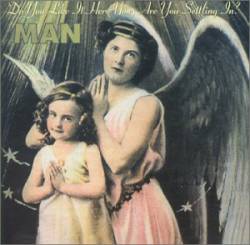 Man : Do You Like It Here Now, Are You Settling in?
Man : Do You Like It Here Now, Are You Settling in?












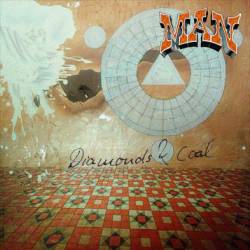
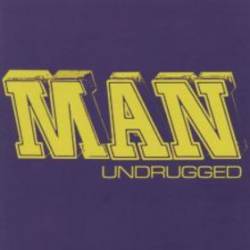



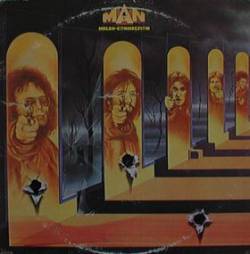
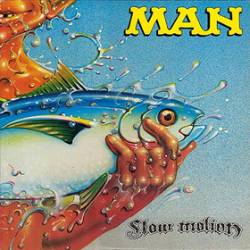
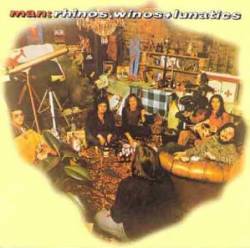
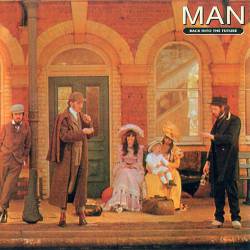
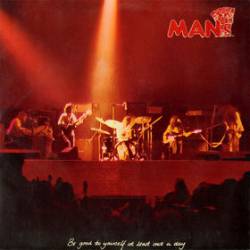
Tienes que ser miembro para poder añadir un comentario